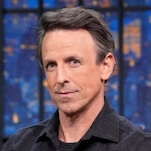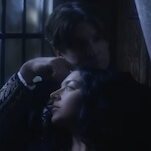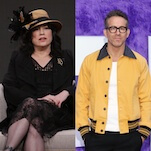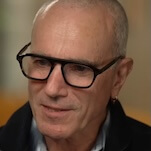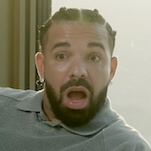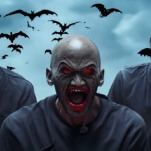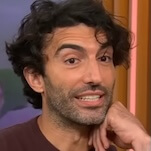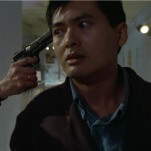If Todd Phillips has a family crest, it sports the Latin equivalent of “Boys Will Be Boys.” Beginning with documentaries about coprophagic punk rocker G.G. Allin and fraternity hazing, and moving into a string of features that include Road Trip, Old School, and The Hangover, Phillips has devoted himself to chronicling the worst—or at least the stupidest—of male excesses. (He’s been guilty of some bad behavior himself: Frat House shared the documentary Grand Jury Prize at Sundance in 1998, but was pulled from its HBO airings after it was discovered that many of its scenes had been restaged for the camera.) With the new Due Date, however, Phillips grows up at least a little. Sure, there’s a masturbating dog, and a scene in which Zach Galifianakis shops for weed with the air of a snooty connoisseur. (“I don’t like blends,” he sniffs. “I find the high to be shapeless.”) But the evolving bond between eccentric would-be actor Galifianakis and incipient father-to-be Robert Downey, Jr. as they share a cross-country drive is the most sustained, fleshed-out relationship in any of his movies (yes, even Starsky & Hutch), an opportunity for Phillips to play with emotional depth and even a trace of sentiment. On the week of the film’s release, Phillips called The A.V. Club from Los Angeles to talk about co-founding the New York Underground Film Festival, what went down with Mel Gibson’s cameo in The Hangover 2, and why Robert Downey, Jr. can punch a 12-year-old in the chest and get away with it.
AVC: And put it within the frame of a character, too.
TP: That’s exactly right. There’s a left-footedness to all of Zach’s stand-up, and to Zach, quite honestly, in person. That, I think, is what we’ve been able to capture in these two movies together. It’s been great for us.
AVC: You’ve worked with several people who come out of stand-up, and in some cases who don’t have a ton of formal acting experience. Do you like having that sort of energy on set?
TP: I do. I like—there’s a better word for it, but I like the danger that a comic brings to a role. It has a feeling, even though everything’s scripted and everything’s planned what you’re going to do. When I see Will Ferrell or Sacha Baron Cohen, there’s a feeling that anything could happen. I feel that with Zach, and I think that’s what I mean by the danger.
AVC: That sense of danger ties back into the earliest thing you did, Hated, the documentary about punk singer G.G. Allin, who was known, among other things, for defecating onstage. Is he the most dangerous person you’ve worked with?
TP: [Laughs.] Yeah, probably. Although some say Mike Tyson, but he’s a sweetheart. I think I’ve always been attracted to that characteristic. What it boils down to is unpredictability. I just love not really knowing where it’s going to go next. You find that with stand-up comics, and I’m sure you found that with G.G. Allin. But I found that even starting with documentaries, not knowing where the story is going to go, there’s an element of surprise in making this movie.
AVC: How do you balance that fondness for unpredictability with the demands of a mainstream comedy, where the audience needs to feel an ongoing connection to the character?
TP: Really, it’s all storytelling. I never really saw it as a balancing act. Not to get too boring, but to me, it’s all storytelling. It’s all a beginning, a middle, and an end. Even in Hated, there’s a character build to G.G. Allin as he gets more and more extreme, as we reveal more and more things about him. There’s still some sense of a story, with a beginning, middle, and end. It’s all really what a director does. Whether it’s documentaries or even narratives, it’s just storytelling, and it’s always that.
AVC: There’s an element of the road trip to a number of movies you’ve done—Road Trip, obviously, but also Borat and Due Date. Do you have a sense of why that framework is useful for you?
TP: To me, it’s very clear. A lot of filmmakers have used it in the past, and it’s really the ability to take your main characters and put them out there without a safety net. It comes back to that sort of danger element. You don’t have the family, the friends, or your belongings surrounding you that make you comfortable in life. You’re just out there flying without a net, and it’s really fun to put your characters through that.
AVC: In terms of the structure of the movie, it gives you the chance to change things up more than you might if they were sitting in one place.
TP: That’s true, for sure. When people say something negative about these movies, they say, “Well, they feel very episodic.” You can’t help that. That’s the nature of a road movie. They’re moving on to the next one. By its very structure, it will be episodic. Hopefully some of those episodes will be hysterically funny enough to carry the movie, and in this case, some of them will be emotional and fucked-up. But you’re right, it’s episodic by nature.
AVC: Do you have a sense of progression through the films you’ve made? Road Trip is about college students, and Old School is about grownups acting like they’re still in college. But in The Hangover, the plot hinges on the unexpected appearance of a baby, and in Due Date, one of the characters is about to become a father.
TP: I think the movies age with me. I tend to make movies about my peer group. I couldn’t see myself now going back and making a movie about a bunch of college kids, necessarily. I kind of always operate in the things I’m observing around me, whether it’s friends having babies now in my life or what have you. But it is definitely something I have noticed also. As I get older, the movies sort of age.
AVC: Do you know if that is happening to your audience as well?
TP: The Hangover was such a big audience. It’s hard to say it was just that, and [the broader audience] is what you aim for, always. So it’s not necessarily I’m just making movies for my age group, but it seems to be where my interest lies, telling stories about that particular group.
AVC: One of the things people rarely know about you is that you co-founded the New York Underground Film Festival. Were you still at NYU at that point?
TP: The whole reason we started the New York Underground Film Festival, which I am proud for having started, and it’s been going on for 15 years even after I was gone, was quite honestly—we started it literally because Hated didn’t get into the Sundance Film Festival. [Laughs.] And I was like, “What? How could that not get into the Sundance Film Festival? It’s a great documentary.” And I thought, “Well, there’s not really a festival…” It’s funny, because the New York Underground Film Festival started the year before Slamdance. Had Slamdance been there, I probably would have just said, “Hey, let’s show it in Slamdance.” But we started that festival the year before Slamdance, which I know is still around and still doing well. It was really about creating an alternative venue.
AVC: An element of shock tactics runs through much of what you’ve done, including Hated and using the NYUFF to show Chicken Hawk, a controversial documentary about NAMBLA. Now it’s masturbating babies and masturbating dogs. Making people’s jaws drop seems to work for you.
TP: Yeah, it’s always been something, going back to Hated and, you’re right, this Chicken Hawk movie, it was a little bit about an attitude more than even the thing. There’s a punk-rock attitude, clearly, to Hated. There’s even a punk-rock attitude to The Hangover, I think. We start the movie with a Glenn Danzig song. I defy you to find me a Judd Apatow production that starts with a Glenn Danzig song. Not that it’s bad, but it’s just got an attitude that says “This is going to be a little bit darker.”
AVC: Were you surprised at the backlash to casting Mel Gibson in the Hangover sequel? That would have been—maybe shocking isn’t the right word, but a surprise that he would turn up.
TP: That’s the best word. With me, the element of surprise is a big thing in comedy, whether it’s Ken Jeong jumping out of a trunk naked in the middle of Las Vegas… the fun and part of the success of making comedy is surprising people. “They didn’t just go there!” When the Mel Gibson thing came out—which of course I wish it hadn’t, in that it just ruined the surprise anyway—it was just dead in the water at that point for me, in the large part, just because it took some of the steam away from it.
To answer your question more specifically, I was kind of surprised at the reaction, because I have always had a little empathy for people who are struggling with addiction, whether it’s with alcohol, as in this case, or whatever. So I’m a little bit surprised at the reaction to him, and maybe it’s because it’s so recent, or maybe it’s because people don’t know the details of his struggle. Know what I’m saying? I expected in our town, in the town of Hollywood, and that business, for people to have a little more empathy, that’s all.
AVC: The comparison has been made with Mike Tyson, and why there wasn’t a bigger uproar over him being cast. There are a lot of differences between the two contexts, but one was that Tyson’s rape conviction had largely faded from the public eye by the time you made The Hangover, while the memory of Mel Gibson screaming at his wife on the telephone was still very fresh in people’s minds.
TP: In the normal world, without the Internet and people talking about things eight months before the movie comes out, that time would have been there. In the best-case scenario, there would have been some time at least for things to play out further and all that stuff.
AVC: One element of your movies celebrates a kind of stupid male behavior, but they’re also about dealing with its consequences. The whole premise of The Hangover is “What the hell did we do last night?” It’s about being in deep shit and trying to get out of it.
TP: That’s sort of the fun of it. I know what you’re saying—it’s not purely a celebration of maleness, or whatever it is. It’s actually a celebration of being fucked up and then figuring out how to fix it in some way. The Mike Tyson thing, and the Mel Gibson thing, in my mind—and maybe I’m just fucking retarded—they fit into that somehow.
AVC: Not all of your movies fit the same template; I don’t think you could apply it to Starsky & Hutch, for example. But there is that common strain of men behaving badly. What brings you back to that?
TP: I like mayhem, and I like bad behavior. I have always liked it, and I think that’s a through-line through most of my work, whether it’s documentaries or narratives. There’s just an element of bad behavior in it that I like. And then trying to make up. And that behavior is always fun to watch, too.
AVC: Due Date has the most intimate, sustained relationship of any movie you’ve made, but it also has car crashes which look like no one could walk away from them alive. You play the two elements off each other.
TP: That’s the reason why we wanted to make it, and that was the reason why Downey wanted to do it. Some people say, “You already did a road-trip movie. You did Road Trip.” It’s very different for me. Really, as a director, you’re a purveyor of tone, if you want to boil it down to one thing. To shift tones in a movie is something I really hadn’t done much of. Due Date is a celebration of shifting tones, which is a very difficult thing for actors and a director to pull off, to go from a really emotional scene between these two guys to a dog masturbating, or to some other kind of bawdy comic moment with Zach and Robert. To be able to switch gears back and forth, that’s not something I could have done when I made Road Trip, quite honestly. I needed experience, I think, to do that. That’s what made the movie challenging, and what made the movie fun.
AVC: Robert Downey’s dramatic chops are pretty well established, but it’s been fascinating to watch Zach, in this movie and in It’s Kind Of A Funny Story, pushing into more emotional territory.
TP: I agree. A lot of people have said, “Zach’s playing the character in The Hangover.” But when you see Due Date, it’s clearly a different character in so many ways. Yes, he’s left-footed with the world, but he’s really going through a trauma and something difficult in his life, having just lost his dad, who was clearly his best friend, and dealing with that. I think it’s a great performance. But also, it’s not just in the action, it’s in the reaction. And Downey is so good at handling that. I’ve never seen anything like it.
AVC: Downey has to walk a thin line. It’s easy for comic anger to cross over into abrasiveness, which stops being funny. And you probably need him to step over that line a few times in the movie.
TP: Absolutely.
AVC: So he can get his ass handed to him by a guy in a wheelchair.
TP: It’s a testament to Downey. He could spit in a dog’s face, and five minutes later, you’re back on his side. And again, I don’t know of any actor that can pull that off. It takes a certain relationship that he’s established with the audience over a lot of his movies that would take advantage of a situation like that.
AVC: If you had some actor you didn’t know punching a 12-year-old—
TP: Or even actors you do know, but who don’t necessarily have that relationship with their audience. Downey, by circumstances even beyond his control, we know his story. We know what he’s been through. We know the battles he’s fought in his own personal life. In some way, we use that in Due Date to keep audiences on his side when he does things that are a bit reprehensible. And Stiller did that [in Tropic Thunder]. I’m not making that up. It’s a harder line to walk.
AVC: How much do you think about what the audience brings into the theater with them, in terms of their relationship to stars?
TP: Oh, all the time. I’ve never seen an audience go into a movie with as open arms as they go into with Robert Downey. They have such a trust for him. Sometimes I say an audience walks into a movie with their arms folded. “All right, Actor X, show me what you can do this time.” With Downey, they come in with open arms. It’s a really interesting thing. It’s something we think about always in casting.

